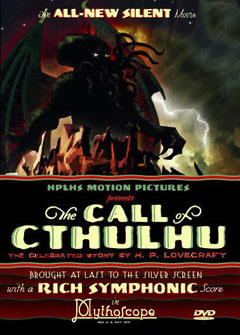Eldrich Abominations Abound for Lovecraft Double Feature
 by Julian Singleton
by Julian Singleton
The stars were finally right at the Austin Film Society screening room on August 29 for a special double-feature screening of The Call Of Cthulu and The Whisper In Darkness. The two films, based on select works of renowned "weird fiction" author H.P. Lovecraft, were brought to the fore under the AFS Avant Cinema banner by the H.P. Lovecraft Historical Society, which dedicates itself to modern appreciation of the late author's work.
Both films are rooted in the extensive mythos that Lovecraft and his successors cultivated through endless collections of short fiction published in pulp magazines and anthologies, beginning in the early 1920s. The premise of Lovecraft's universe was that the cosmos is secretly under the control of the Old Gods, a supreme race of beings that held humanity's fate within its clutches. Those who happened to stumble upon this revelation were faced with either madness, death or worse -- inescapable, crippling sanity.
Such protagonists populate the two movies screened at the retrospective. The Call Of Cthulu features a man who recounts his discovery of a cosmic conspiracy involving an ocean-dwelling God and the unfortunate cast of characters who were influenced by its power. The Whisper In Darkness, on the other hand, follows a professor of folklore goaded into debunking the tales of mysterious creatures populating the New England hillside ... only to discover that these tales are all too true.
The sold-out screening might have proved equally unimaginable to the source material's creator: While Lovecraft was able to publish a litany of short fiction over the course of his career, he failed to gather critical and financial acclaim during his lifetime. Plagued by financial and physical maladies since childhood, Lovecraft left this physical dimension in 1937, penniless and obscure. After his death, however, his tales amassed a vocal cult following -- influencing such horror authors and filmmakers as Stephen King, Robert Bloch, and John Carpenter.
While horror artists have paid homage to Lovecraft, direct adaptations of his work have been few and far between, which could be attributed to the fantastical yet wholly internal dilemmas that his works feature. How best could one depict the unimaginable beings of these tales without setting oneself up for disappointment?
The Historical Society's adaptations, spearheaded by Sean Branney and Andrew Leman, have eagerly confronted this challenge by utilizing a homemade process aptly known as "Mythoscope." Rather than transpose conventional moviemaking ideas onto works that predated them, Branney and Leman instead opt to combine low-budget filmmaking technology with silent-era filmmaking techniques such as stop-motion animation and intertitles to make these films appear as relics from a forgotten era of cinema. The Call Of Cthulu, written in 1926, is presented as a silent film a la Melies; 1931's The Whisper In Darkness, composed in the budding age of "talkies," fittingly becomes the Historical Society's first sound feature. As a result of bridging cinematic time and space, these two short films bring together Lovecraft's past with our present in a fashion befitting the Old Gods of his work.
While the narrative difficulties of adapting Lovecraft's ideologically heady work still rear their head on occasion -- notably the dialogue-heavy first act of Whisper In Darkness -- these two films reflect a rare respect and admiration for their source material. While challenging tales to tackle, the enthusiasm that shines in Cthulu and Whisper wholly reflects the Historical Society's motto of "Ludo Fore Putavimus..."
Which directly translates as, "We thought it would be fun."
Julian Singleton is an intern at the Austin Film Society.

